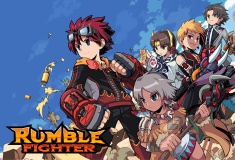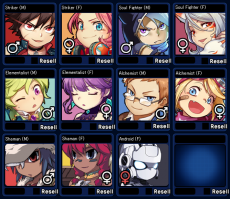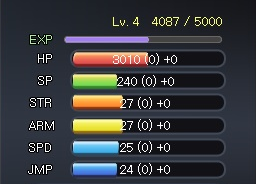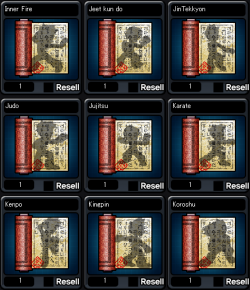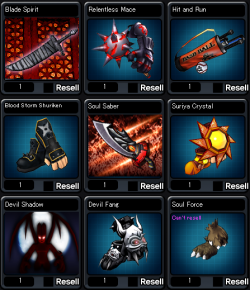Rumble Fighter
| Genre | Massively Multiplayer Online Role-Playing Game |
| Gamming Style | MMORPG |
| Platform | Windows, Steam |
| Release Date | August 2, 2007 (USA) |
| Developer | Nimonix
WeMade Entertainment (2007-2011) [1] |
| Publisher | RedFox Ent. (2016 - ),
GamesCampus (2014-2016), OGPlanet (2007-2014) |
| Website | https://www.playredfox.com/rumble_fighter |
Rumble Fighter[2] is a free-to-play, fighting, massively multiplayer online role-playing (MMORP)[3] game developed by Nimonix and WeMade Entertainment available on the PC. [4] The game characters are customizable, allowing players to create characters with unique fighting styles and transformations. Players can choose between different forms of gameplay, including engaging in free-for-all battles against one another or fighting teams on a variety of different maps and game modes.
Contents
History
Rumble Fighter was originally produced by Nimonix and WeMade Entertainment but has gone through multiple publishers throughout its development. OGPlanet was the first publisher to work with the developers in 2007 and later released Rumble Fighter after receiving positive feedback from beta testers. The game flourished in its initial years as many players were drawn to the game's unique design. However, as the game became increasingly popular, hackers began exploiting the game, discouraging WeMade Entertainment from continuing its development alongside Nimonix.
In 2014, Rumble Fighter announced that it would be moving its publisher to GamesCampus as Nimonix and OGPlanet were unable to reach an agreement to continue service. Following the contract termination, Nimonix decided to set a 30 item limit to the allow transfer of items, which outraged many players. As a result, there was a significant drop in the number of players as the game transferred to GamesCampus.
GamesCampus was eventually bought out by a competitor that decided to put an end to Rumble Fighter’s services after continuing declines in its player base. Former GamesCampus CEO David Son decided to make a new startup company called RedFox Games that would later adopt Rumble Fighter and provide full account transfers to current players who still loved playing the game.
In 2016, Rumble Fighter was released on Steam where it is presently hosted. Since changing platforms the game has continued to have low player numbers, with an all-time peak of 32 users playing concurrently since being added to Steam.[5] The game is also available through other video game distribution catalogs similar to Steam such as Pmang in Japan and Webzen’s PC room in South Korea.
Gameplay
Classes
There are currently six unique classes in Rumble Fighter each specializing in its own abilities.
- Striker: Physical strength; close combat; low spirit
- Soul Fighter: High speed; low defense, hit-and-run attacks
- Elementalist: Long-ranged; strong psychic powers; high spirit
- Alchemist: High defense; slow speed; mechanical weapons
- Shaman: Souls and spirits; well-balanced stats; inflict status effects
- Android: A combination of offense and defense; recover spirit points; repeated ExoCore
Attributes
Each class has its own unique set of preset attributes(stats) that can be affected depending on items equipped onto the character as well as gem enchantments within the game.
- Health Points (HP): Health meter
- Skill Points (SP): Special skills meter
- Strength (STR): Damage meter
- Armor (ARM): Defense meter
- Speed (SPD): Movement speed meter
- Jump (JMP): Jump height meter
Scrolls and Exocores
Scrolls and Exocores are equipable items in the game. Scrolls determine your fighting style within Rumble Fighter. Each Sacred Scroll is unique and draws from many traditional fighting styles as well as fantasy fighting styles. Exocores allow players to transform and gain new abilities depending on the class they choose. Many Exocores are shared within all classes, but some Exocores are class-exclusive.
EXP and Carats
Players in Rumble Fighter gain experience points (EXP) and level up the more they play. Each level is separated based on total EXP accumulated throughout the game and gives players access to more game modes, systems, and items as they level up. Carats are the in-game currency used in Rumble Fighter to purchase various items within the in-game shop to customize their characters. Carats are earned by playing the game in any mode, game events, and also by selling owned items. There is also an alternative cash currency called Astros that is obtainable by purchasing with real money that allows players to purchase the same items as they would with Carats but with real money instead.
Game Modes
Rumble fighter has a variety of different game modes that players can choose from while playing the game. Each mode has its own set of maps that players battle on either single-player or multi-player, both with and against other players.
- Battle Mode: For players who enjoy free-for-all battles. The objective is to defeat everyone else on the map and to be the last one standing.
- Rumble Mode: There are five different Rumble Modes that each have their own objectives.
- King of the Hill: Players fight one another to control a certain area on the map. Whoever controls this area the longest will win King of the Hill.
- Moving Screen: Players begin at the ground level of the map while fighting one another. As the match continues, the map will slowly begin moving upwards and players will have to avoid falling off of the map while defeating other players with the same goal.
- Caged Beast: Players play in teams fighting opponents one-on-one as the rest of their teammates await in cages. Each cage will open one at a time when the current fighting player on their team is defeated. The next player will have to fight the same opponent until they are defeated. This continues until all players on one team are defeated.
- Potion Battle: Players battle to drink their way to victory as each player runs around the map finding potions scattered around. The player that drinks the most potions within a given time limit is the winner.
- Arena: Players are thrown into a small arena where each team has to try and acquire the most kills possible. Once a kill count of 12 is reached for their team, that team wins.
- Adventure Mode: For players who enjoy playing alongside other players against game bosses. Players must fight through waves of monsters before reaching the final boss.
Ethical Concerns
Trading System (Scamming)
Trade scamming[6] is when one player takes advantage of another player’s trust or ignorance inside the game and steals from that player via in-game means. The player committing the act is called the scammer and the scammer achieves this usually by promising the victim a certain item in return for another item. Once the scammer receives the item they want from the victim, the scammer breaks the agreement by not returning the gift as promised and will block the victim from all forms of communication. As a result, the victim is left emotionally damaged while also losing currency within the game, This can often translate to real-life currency for in-game items that were purchased by the player. Due to the lack of formal trading systems within the game, this is one of the most common forms of scamming that occurs. The impact left on the victim can be quite severe as Rumble Fighter does not take responsibility for any scams that occur within the game. Rumble Fighter has repeatedly stated that the support team will not compensate victims of scam incidents nor will take action on the scammer no matter how vile the scam may be. Scamming is very common in Rumble Fighter, as it is in other games. Multiple players in Rumble Fighter resort to scamming in an attempt to trick new or ignorant players into trading items they would otherwise have to earn or pay for themselves. As a result, this has discouraged many players from continuing with their gameplay.
Hacking
Hacking in Rumble Fighter is similar to scamming but much more severe. Hacking occurs when one player is able to gain access to another player’s account. Once the hacker gains access to another player's Rumble Fighter account, they will sell all of the other player’s items and will use the currency gained from the sold items in order to gift multiple items back for themselves. The most common way for hackers in Rumble Fighter to gain access to these accounts is usually by taking advantage of the other player’s trust. The hacker will usually promise something in exchange for the other player’s account information such as free items or in-game currency. Again, this can leave severe emotional damage on the user who have lost all progress within the game as the Rumble Fighter support team does not take responsibility for such actions and will not do anything to help support the victim, which causes many players to eventually quit playing the game. Rumble Fighter's response is only to not give personal information to strangers online.
Flaming
Flaming[7] is a form of cyberbullying that involves posting hateful and hurtful comments about another user online. Within Rumble Fighter, flaming is very common as many players become frustrated with their teammates and will resort to degrading them as a result of their poor in-game performance. Currently, the punishment of flaming in Rumble Fighter is a chat restriction/limitation where a player is prevented from using the chat feature in the game for a set period of time. This type of online behavior tends to be facilitated by the anonymous nature of the game, allowing players to sign up with any name they want.[8] Rumble Fighter gives users a sense of psychological freedom to act aggressively and threaten other users without any serious repercussions. As a result, individuals are able to attack others while hiding behind a screen, often driving other users away from the game and can inflict undeserving suffering. This type of harassment can have real-life consequences, as many players tend to experience emotional pain from their in-game experiences.
Many methods for reducing this form of harassment have been recommended. While chat restrictions have served some purpose, censoring bots and other forms of chat moderation have also been used to reduce the amount of hostile chat between players. However, these forms of moderation are not as effective in games that allow voice chats between players. Overall, the amount and types of hate speech used by players needs to be dealt with on a case-by-case basis. While it is possible for parents of children to restrict access to these features, adults can also be the victim of this verbal abuse with little to no consequence. Overall, most publishers recommend disabling these features as the most effective way of avoiding flaming. [9]
Griefing
Griefing is an activity undertaken by a player in an attempt to disrupt and annoy another player on purpose. [10] This can involve a variety of methods including cheating, stealing items, team kills and causing as much general grief to other players as they can. This can occur through a variety of methods in Rumble Fighters, including opponents specifically targeting one player during a match or actively attempting to trade scam another user. While some players may enjoy griefers, seeing them as a challenge to overcome, others consider griefing as a form of cyberbullying that should be moderated. Rumble Fighters inability to deal with players like these was a contributing factor in causing players to leave the game.
Pay-to-win
Players in Rumble Fighter can purchase items in the shop in order to boost the strength of their characters. However, these items are quite expensive and it takes many hours to buy just one item within the game using in-game currency. However, Rumble Fighter also allows players to purchase the same items with real-life money called Astros, allowing users to gain access to these items without investing the same amount of time and effort into the game. This divides the player population into players who are willing to use the pay-to-win system and those who are not. As a result, many users who do not spend money on the game are forced to fight against players who have bought extremely powerful upgrades and items. This has caused many users to complain that the game is no longer enjoyable for these “weak” players since they cannot compete on the same level.
This often categorizes Rumble Fighter as a “pay-to-win”[11] video game. Shops within MMORPG games usually do not compensate for the lack of real money spent or do they balance such factors so it highly encourages players to spend real money on the "free" game in order to have a better experience. Microtransactions in games have become increasingly common since the development of PC games. This has resulted in a large debate surrounding the issue of the ethics of pay-to-win systems. While it has been stated that free games, such as Rumble Fighter, depend on microtransactions in order to sustain themselves, others have argued that these transactions have created an unbalanced system. In addition, creating a game that requires players to pay for better items as they reach higher levels can be considered unethical in that it often forces players to abandon their progress or pay for the items.[12] As a result, the development of the pay-to-win system in Rumble Fighters has also contributed to its decline in popularity.
References
- ↑ "Rumble Fighter Wikipedia" https://rumblefighter.fandom.com/wiki/Main_Page
- ↑ "Rumble Fighter" https://www.playredfox.com/rumble_fighter
- ↑ "MMORPG" http://si410wiki.sites.uofmhosting.net/index.php/MMORPGs
- ↑ "Rumble Fighter Development" https://www.ign.com/articles/2011/02/03/rumble-fighter-adds-new-guild-system-and-guild-channel
- ↑ "Hosting Sites"https://steamcharts.com/app/357500#All
- ↑ "Trade Scamming" http://rumblefighter-help.playredfox.com/en/support/solutions/articles/8000033360-trade-scamming
- ↑ "Flaming" http://si410wiki.sites.uofmhosting.net/index.php/Flaming#Flaming_in_Video_Games
- ↑ "Stop Bullying"https://www.stopbullying.gov/cyberbullying/kids-on-social-media-and-gaming
- ↑ "Chat restrcitions"https://www.cybersmile.org/advice-help/gaming/types-of-abuse
- ↑ '"Griefing"https://link.springer.com/article/10.1007/BF03392354#:~:text='Griefing'%20is%20a%20term%20used,own%20personal%20enjoyment%20or%20gain.
- ↑ "Pay-to-win" https://en.wikipedia.org/wiki/Free-to-play#Pay-to-win
- ↑ "Pay-to-win" https://www.researchgate.net/publication/329403049_Come_for_the_game_stay_for_the_cash_grab_the_ethics_of_loot_boxes_microtransactions_and_freemium_games.

